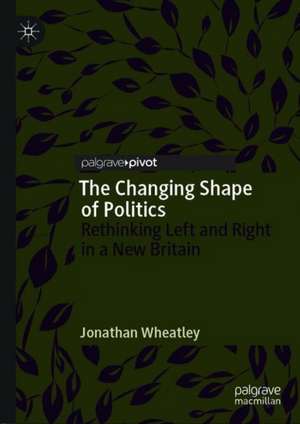The Changing Shape of Politics: Rethinking Left and Right in a New Britain
Autor Jonathan Wheatleyen Limba Engleză Hardback – 31 ian 2019
Preț: 422.70 lei
Nou
Puncte Express: 634
Preț estimativ în valută:
80.89€ • 84.14$ • 66.78£
80.89€ • 84.14$ • 66.78£
Carte tipărită la comandă
Livrare economică 15-29 aprilie
Preluare comenzi: 021 569.72.76
Specificații
ISBN-13: 9783030039394
ISBN-10: 3030039390
Pagini: 149
Ilustrații: X, 173 p. 20 illus., 16 illus. in color.
Dimensiuni: 148 x 210 mm
Greutate: 0.45 kg
Ediția:1st ed. 2019
Editura: Springer International Publishing
Colecția Palgrave Pivot
Locul publicării:Cham, Switzerland
ISBN-10: 3030039390
Pagini: 149
Ilustrații: X, 173 p. 20 illus., 16 illus. in color.
Dimensiuni: 148 x 210 mm
Greutate: 0.45 kg
Ediția:1st ed. 2019
Editura: Springer International Publishing
Colecția Palgrave Pivot
Locul publicării:Cham, Switzerland
Cuprins
Chapter 1: Introduction: British politics in turbulent times.- Chapter 2: Beyond left and right: The end of an old order?.- Chapter 3: Patterns of Political Competition.- Chapter 4: Towards a more Polarised Britain?.- Chapter 5: The European Perspective.- Chapter 6: Conclusion. Making sense of it all.
Notă biografică
Jonathan Wheatley is a lecturer in Comparative Politics at Oxford Brookes University, UK. He has published widely on democratization in post-communist countries; parties, party systems and political cleavages in both established and developing democracies; and the development and deployment of voting advice applications (VAAs).
Textul de pe ultima copertă
"A lucid, evidence-packed analysis which persuasively argues that, in an age of austerity and insecurity, where we might have expected economic concerns to trump everything else, cultural rather than class differences now constitute the essential terrain on which today’s (and tomorrow’s) political battles will be fought."
—Tim Bale, Queen Mary University of London, UK
Caracteristici
Reconceptualises how we understand “left” and “right” in Britain Examines how patterns of party competition in Britain have changed as a result of the 2016 EU referendum Draws from a number of unique sources of public opinion data
